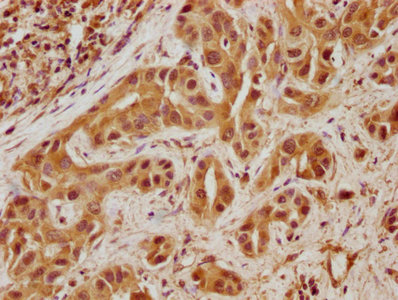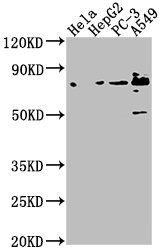Full Product Name
Rabbit anti-Homo sapiens (Human) TNS4 Polyclonal antibody
Alternative Names
C terminal tensin like antibody; C terminal tensin like protein antibody; C-terminal tensin-like protein antibody; CTEN antibody; FLJ14950 antibody; PP14434 antibody; TENS4_HUMAN antibody; Tensin 4 antibody; Tensin-4 antibody; Tns4 antibody
Immunogen
Recombinant Human Tensin-4 protein (20-231AA)
Immunogen Species
Homo sapiens (Human)
Conjugate
Non-conjugated
The TNS4 Antibody (Product code: CSB-PA810319LA01HU) is Non-conjugated. For TNS4 Antibody with conjugates, please check the following table.
Available Conjugates
| Conjugate |
Product Code |
Product Name |
Application |
| HRP |
CSB-PA810319LB01HU |
TNS4 Antibody, HRP conjugated |
ELISA |
| FITC |
CSB-PA810319LC01HU |
TNS4 Antibody, FITC conjugated |
|
| Biotin |
CSB-PA810319LD01HU |
TNS4 Antibody, Biotin conjugated |
ELISA |
Purification Method
Antigen Affinity Purified
Concentration
It differs from different batches. Please contact us to confirm it.
Buffer
Preservative: 0.03% Proclin 300
Constituents: 50% Glycerol, 0.01M PBS, pH 7.4
Tested Applications
ELISA, WB, IHC
Recommended Dilution
| Application |
Recommended Dilution |
| WB |
1:500-1:2000 |
| IHC |
1:20-1:200 |
Storage
Upon receipt, store at -20°C or -80°C. Avoid repeated freeze.
Lead Time
Basically, we can dispatch the products out in 1-3 working days after receiving your orders. Delivery time maybe differs from different purchasing way or location, please kindly consult your local distributors for specific delivery time.
Usage
For Research Use Only. Not for use in diagnostic or therapeutic procedures.





